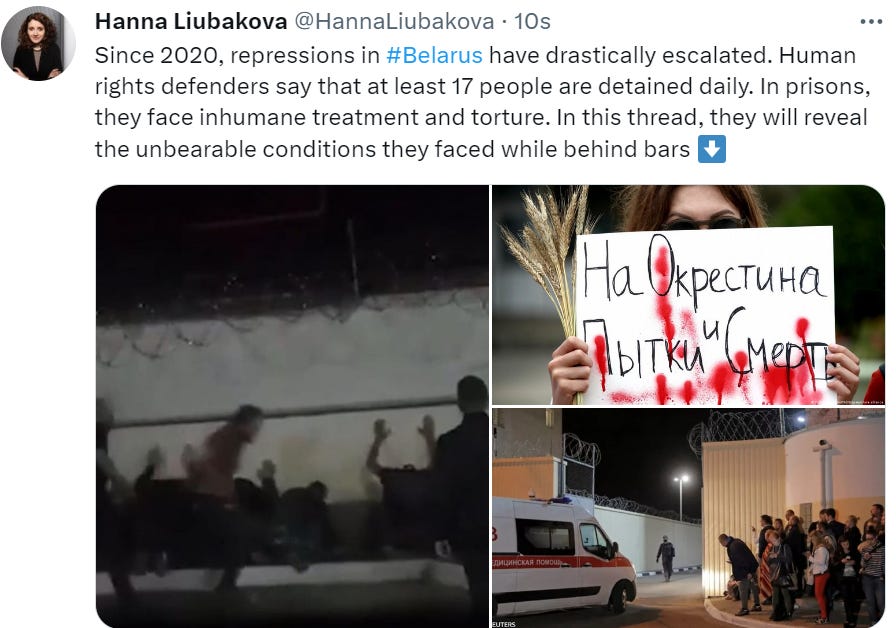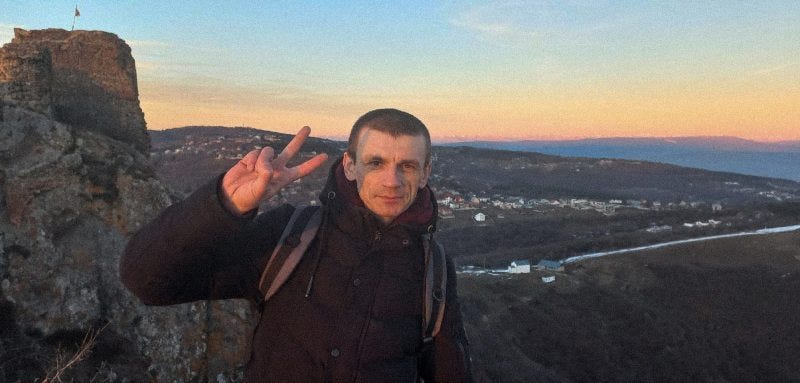Apr 15: Hanna Liubakova- Detentions in Belarus
Thread published by Hanna Liubakova on April 13, 2023
“Prison guards constantly turned off the water in our cell. Only iced-cold water came from the tap for 1 or 2 hours. The toilet smelled so badly that one could suffocate by the urine odour,” said an ex-political prisoner who served her term in a detention centre in Zhodzina.
“There was one nurse who refused basic treatment to everyone. [...] medicines were given only to those who had prescriptions. Those beaten during detention were not sent to a hospital, so they didn’t get medical help,” says 33-year-old Anton, detained twice in 2020 and 2021.
“On the way to the shower in the detention centre in Zhodzina, a riot police officer didn’t like what my cellmate said. Our washing time was reduced to 5 minutes. There were 6 showers for the 12 of us. We had to wash two in a cabin,” recalls Anna from Minsk, arrested in 2020.
“Prison officers didn’t care; you could wash in the sink if your shower time was over. A common situation was when they put homeless people in the same cell, who often brought pediculosis and other things with them,” continues Anna.
Vlad was detained in 2022 in Minsk for protests against the war in Ukraine. A riot police officer beat him so severely that his collarbone got broken. He got a fever & his blood pressure increased. He was taken to a police department & spent 2 days without food, water & medicines.
“A prison guard can be the first to say hello and accuse a prisoner of not saying hello. This is enough to send a prisoner to solitary confinement, to deprive them of packages or meetings with relatives,” said ex-political prisoner Danila Hancharou, who served his term in Shklou.
“There was one shower for almost 100 people. You had to "book" it in advance. It's a lot of stress; everyone quarrels & hurries you up,” recalled ex-political prisoner Volha Klaskouskaya who spent 791 behind bars.
“Sometimes in the morning, I didn't have time to go to the toilet because there were four toilets for 100 people,” Volha Klaskouskaya continued. “Once, I spent 30 days in a row in solitary confinement, and during all that time, I didn’t even get a hairbrush,” she added.
“For the first six days in Zhodzina, there were 18 of us in a six-bed cell,” Siamion Bukin said about his 15 days behind bars in 2020. He is a gymnast and a Cirque du Soleil artist arrested during mass protests against the regime in Belarus.
“This is humiliating, of course. I brushed my teeth for a month with crushed coal and cotton wool, which doctors gave us instead of pads. But then, even this stopped. Later, they gave us only one pad per day,” said a woman detained and imprisoned in Akrescina in 2022.
People detained for politically motivated reasons are still prohibited from sleeping in detention centres. “The light is never turned off. Prison guards woke prisoners up at 2 and 4 in the morning. This is torture with sleep deprivation,” the woman continued.
"You can't read, receive or write letters in solitary confinement. You are completely alone," recalls Vitaly Zhuk, father of 4 children, who served his term in a Babruisk colony. "If you get this punishment, they don't let you go for a walk: you sit in a cell 24 hours a day."
"They [Akrescina guards] know how to hit, so they do not leave traces. They can knock you on the floor, put a chair on top, sit on it and ask: "Do you like it?" said Hanna Vishniak about her time in the Akrescina detention centre in Minsk.
"The cells were always overcrowded. The maximum was 40 people in a four-bed cell. The minimum was 27 people in a six-bed cell. Among us was a guy with Covid who infected everyone else. He warned that he was sick when he was detained," says a man detained in February 2022.









